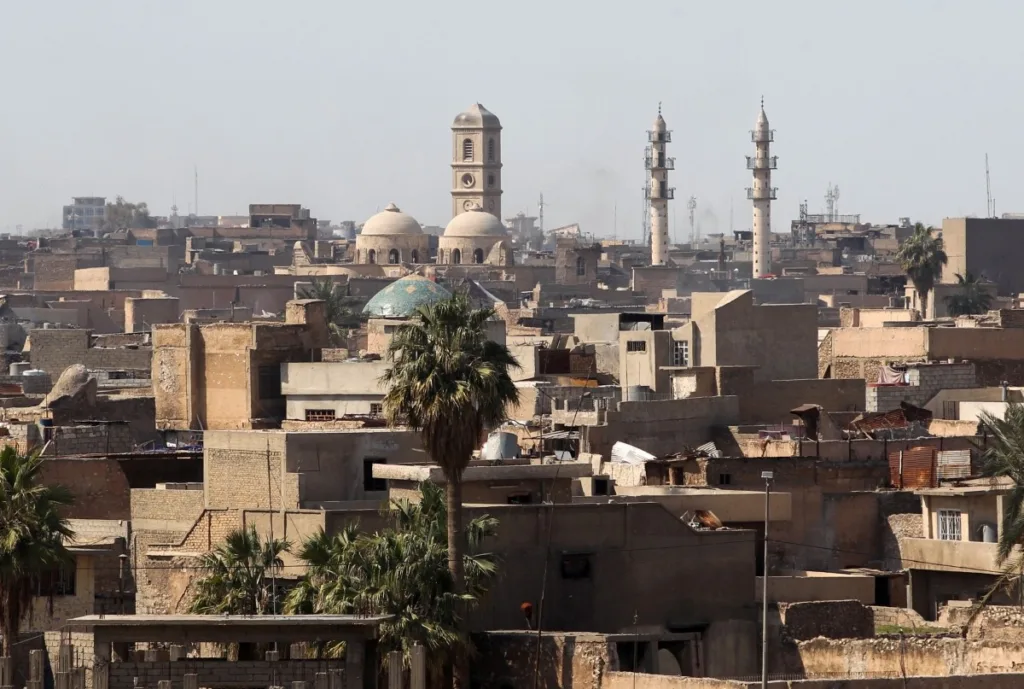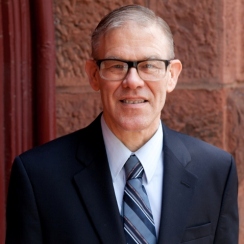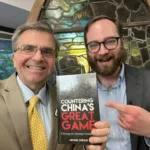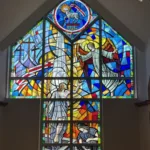Difficulties suffered by religious groups where religion is strongly bound up with ethnic identity, and that identity is strongly bound up in long-running political struggle may not get the attention, or even recognition as persecution, as do direct state measures against particular religious belief and practice. In Much of Eastern Christianity, for instance, particular churches are identified with particular ethnicities (e.g., Russian Orthodox Church, Greek Orthodox Church, etc.). Communist persecution of these churches was clearly recognized. But the suffering of Christians in the Middle East due to the upheavals of the twenty-first century shades off into politics.
The rights of indigenous religious communities, and their infringement was the topic of a breakout session at the International Religious Freedom Summit on January 30 in Washington, D.C. W. Cole Durham, Founder of the International Center for Law and Religion Studies at Brigham Young University introduced a panel to discuss the situations regarding religious freedom of various indigenous communities in different parts of the world. Out of the many situations that could be highlighted, the panel was focused on indigenous communities in Bolivia, Iraq, Syria, and Egypt. Durham said that the United Nations’ definition of indigenous communities is “those which having a historical continuity with pre-invasion or precolonial societies … who consider themselves … distinct from other sectors of the society” that “developed on their territories.”
Indigenous Communities in Bolivia and Freedom for Traditional Life
Durham said that one of the speakers, Senator Cecilia Moyoviri Moye of Boliva was unable to get a visa to travel to the United States, but he did have the text from her letter, which he read. She wrote that “by profession I am a weaver, and provide workshops and training related to this craft.” Many rights are guaranteed in the Bolivian constitution, but they are basically rights on paper. There is a vast diversity of cultural groups in Bolivia, she said, a total of 36. “My struggle has always been focused on the recognition and guarantee of the rights of indigenous, aboriginal peoples.” She recited many of the rights that the Bolivian constitution guarantees. But she said that the government “is the main violator and promoter of the violations and infringements that are being carried out against indigenous peoples.”
She identified mining operations in Bolivia as a major violation of indigenous peoples’ guaranteed rights. It is destructive of “their culture, beliefs, rights, customs, identity and religion.” She said that due to mining operations, “the soil becomes infertile because it progressively loses productive capacity due to the removal of arable and productive soil … Rivers are poisoned with mercury, which severely affects the fish population and in turn affects the food supply vital to the sustenance of indigenous families.” She also said that indigenous people are “often inadequately represented, and therefore do not receive the attention” they deserve. Traditional means of hunting and fishing are “replaced by fishing with dynamite, and hunting with firearms,” and traditional crops are replaced with coca, which is more profitable. The interests of indigenous people are set aside, and their cultures are destroyed for investors and the elite, who are connected with the ruling political party. The depredation of the land results in many indigenous peoples moving to the city.
Iraq and Chaos in the Aftermath of War
Alda Benjamin, Assistant Professor of History at the University of Dayton then spoke regarding the plight of religious minorities in Iraq. Benjamin said that her research focused in part on Alqosh, Iraq, the “Vatican of Eastern Christianity,” the headquarters of the patriarchal see of the Church of the East. (sometimes called the “Nestorian Church”) for four hundred years. She observed that the Church of the East dates from the First Century A.D., and “spread the faith to China, India, and of course, Mesopotamia.” Iraq had a history of great ethnic and religious diversity, and it can again be a pluralistic country, she said. But minorities in Iraq today suffer from “loss of property, and loss of real representation.” These losses are similar to the loss of land and the ineffectual voice of minorities in Bolivia, Benjamin believes.
Christians in Bagdad and southern Iraq have lost housing in recent years to Iran-backed militia. This is a matter of directly forcing the families to leave. The confiscation of the agricultural lands of Christians has a much longer history, dating back to the civil war in Iraq which began in 1961. Added to this are “government attacks and forced displacement of rural communities, communities of Kurds, Yazidis, and others, in the 1970s and 1980s.” Many of the displaced people were able to return in 1991, after the establishment of “safe havens,” but found that their lands had been taken by more powerful tribes. There were 76 confiscations of land documented. Kurds have claimed a significant amount of land formerly occupied by Assyrians. Court orders from the Kurdish Regional Government (KRG) to return confiscated lands remain unfulfilled.
The discovery of oil on Assyrian lands is an added incentive to seize them. Since the U.S. intervention in Iraq in 2003, the Christian population of Iraq has dwindled from 1.5 million to about 300,000. The Babylon Brigade holds most of the Christian seats in Parliament (5), although many Christians do not regard them as their legitimate representatives. Local control of government spending on infrastructure would improve recovery from the recent wars in the area, Benjamin believes.
Syria, a Beacon of Hope, and an Ominous Threat
Next, Bassam Said Ishak, member of the Presidential Council of the Syrian Democratic Council spoke regarding religious minorities in Syria. Ishak said that there is, in fact, “a beacon of hope for religious freedom in northeast Syria.” He mentioned the different religious minorities in Syria – Christians, Druze, Alawi, Ismaili, Yazidi, and there are many others. Syrians are “assigned their religious identity at birth, according to the faith of their parents.” The only religious freedom in Syria is the right of free worship “in places of worship recognized by the government,” he said. “Syrians are not legally free to change their religion, except in the case of converting to Islam.” The law also requires a Christian man to convert to Islam if he wants to marry a Muslim woman. A Christian woman, on the other hand can remain Christian if she marries a Muslim man but has no inheritance rights. Her children, as well, are classed as Muslim. Conversion from Islam to another faith is prohibited.
One way religious minorities in Syria are burdened is through economic pressure. An important factor is the nationalization of lands, which occurred in the 1960s and 1970s. “Very little of the land confiscated from Christian landlords was given to Christian families.” Many then emigrated to other countries. The disadvantages described apply to non-Muslim minorities in government controlled areas of Syria, but the situation of Christians and Yazidis in areas controlled by Syrian rebels is “even worse.” There is pressure in those areas “to convert to Islam,” on pain of losing one’s home.
Ishak said that the “beacon of hope” for religious freedom in the area began in 2013 in northeast Syria. This is an area occupied in part by Syriac Christians, Kurds, Arabs, and others. The withdrawal of Syrian forces to fight in northwest Syria in 2013 resulted in a power vacuum. Local political groups in northeast Syria “organized themselves to fill the void.” Militarily, they were the Syrian Democratic Forces, politically, they were the Autonomous Region of North and East Syria. Their “social contract” was “based on three main pillars”: all ethnic groups’ languages are official, secondly, equality of the sexes in which men and women equality share political power, thirdly religious freedom, with all citizens free to determine to believe or not to believe, “and most importantly, to choose what to believe.”
The social contract was described as a “document of political and social revolution in the whole region, not just in Syria.” It has the potential to defuse religious extremism “ideologically.” The Syrian Democratic Forces were allied with the U.S. military to defeat ISIS. This was successfully done, but “at the cost of 12,000 lives” of local Syrian fighters of all religions and ethnic groups. But shortly after the defeat of ISIS, “Turkey staged a ground invasion of northeast Syria, under the pretext of fighting Kurdish terrorism. The invasion was brought to a halt by the U.S diplomatic intervention, which included economic sanctions on certain Turkish officials.” But in late 2023, Turkish President Reccep Tayyip Erdogan threatened the Syrian Democratic Forces with “extinction,” and Turkey began air strikes against civilian infrastructure in northeast Syria. As of late January, there were 200 strikes, attacking “water, electrical plants, hospitals, oil production facilities, wheat silos … schools”, and other establishments. This in turn has degraded the SDF’s capacity to fight ISIS. “The campaign was carried out using F-16 American fighter jets.” In this situation, “what is required is a strong and courageous stand by the free world.”
The Copts and Perennial Social Disadvantage
Mark Basta, an Evangelical Copt of Coptic Solidarity and Undergraduate Research Fellow at U.C. Berkeley, spoke last. Basta said he was not representing anyone but was just “sharing my humble thoughts.” There is really no one who speaks for all the Copts, he maintained, although the Coptic Pope of Alexandria is held to represent the Copts to the President of Egypt. He defined the Copts as “an ethno-religious minority” indigenous to Egypt.
Basta recounted two cases of the kind of torment and injustices suffered by the Copts. First was the story of a Coptic woman assaulted by a gang of Muslim men. It was subsequently reported to the police, and the men prosecuted. But they were acquitted, and in a case running for several years, it was appealed to the highest court in Egypt, which confirmed the acquittal. despite witnesses testifying to the attack. The men later threatened to sue the woman for defamation.
In another case, a child found as an infant in a church was given by its priest to a childless couple but was removed four years later from his home by the Egyptian government and raised as a Muslim. After intense media attention and public pressure the child was given temporarily back to his adoptive parents. Basta observed that “there is a clear complicity not only between members of society but also governments in the way they treat Copts.” A problem the Copts have is a kind of official narrative of “national unity and persecution denial.” It is claimed that there is no difference between Copts and Muslims in Egypt. Violence that occurs is then reported without reference to the religion of the attackers or victims. In line with this, it is now claimed by some that the Copts are simply a religious group, not indigenous to Egypt. There may be a lack of clarity about the extent of the Coptic population of Egypt. Some are Orthodox and some are Evangelical. But both are authentic Copts, Basta said.
Another problem for the Copts is underrepresentation in Parliament, national institutions, and national life generally. Part of this is the “hollow justice system.” In place of formal, legal justice in the courts there are “customary conciliation sessions … outside of the official judicial system.” These sessions often result in “highly biased decisions against Coptic people.” Bias can also be seen in the use of blasphemy laws.
Yet another problem for the Copts is what Basta called “securitization.” The lack of secure borders is used “to explain and justify the military rule of the county.” Any opposition to the government thus endangers society. Copts are safest, it is held, with a strongly authoritarian government.
Typical forms that the persecution of the Copts in Egypt can take, commonly occurring every month, include “forceable migration and kidnapping,” the closure of churches, “the bombing of another, and even the murder of a Christian,” who are said to be “disturbed or mentally deranged. One week is enough to portray the magnitude of the ordeal that they are faced with.”
Conclusion
While many of the foregoing conflicts may seem to be ethnic, cultural, or political struggles, there remains in all of them a religious aspect. The religious life and conscience of these communities should have protection from the state, and the non-state actors who have devastated them. Our government has religious freedom as a foreign policy objective. While its ability to ensure protection may be limited, it should be an active part of American foreign policy, and as American citizens, we should continue to speak in support of indigenous communities.
No comments yet





